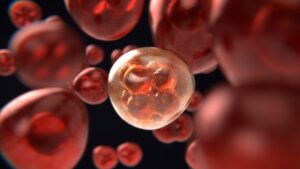 Myeloproliferative neoplasias (MPNs) are a heterogeneous group of clonal diseases of hematopoietic stem cells characterized by increased proliferation of cells of the myeloid lineage in the bone marrow (BM). Ph-negative MPNs are the most common risk factor for vein thrombosis (VLT), including Budd-Chiari syndrome (BCS) and portal vein thrombosis (PVT). A number of studies have addressed the role of all etiologic and risk factors for VLT, including acquired prothrombotic conditions, hereditary thrombophilia, and local disease. The present communication describes a rare clinical case of a female patient with 3 risk factors for BCS: Ph-neg. MPN caused by acquired JAK2V617F mutation, inherited coagulation disorder, factor V Leiden mutation, and use of hormonal contraception.
Myeloproliferative neoplasias (MPNs) are a heterogeneous group of clonal diseases of hematopoietic stem cells characterized by increased proliferation of cells of the myeloid lineage in the bone marrow (BM). Ph-negative MPNs are the most common risk factor for vein thrombosis (VLT), including Budd-Chiari syndrome (BCS) and portal vein thrombosis (PVT). A number of studies have addressed the role of all etiologic and risk factors for VLT, including acquired prothrombotic conditions, hereditary thrombophilia, and local disease. The present communication describes a rare clinical case of a female patient with 3 risk factors for BCS: Ph-neg. MPN caused by acquired JAK2V617F mutation, inherited coagulation disorder, factor V Leiden mutation, and use of hormonal contraception.
The diagnostic-therapeutic algorithm for the specific patient exactly follows the current opinions on behavior in this condition, including the evaluation of all possible prothrombotic risk factors.
The patient continues his regular follow-up by a gastroenterologist and a hematologist, maintaining a good quality of life with no new thrombotic events and normal hematological parameters.
The presented clinical case confirms the role of routine screening for MPN in TVL. Screening for congenital thrombophilia is warranted regardless of the patient’s JAK2 status because of the likelihood of a multifactorial genesis of thrombosis in this condition, which on in turn necessitates the application of a different mechanism of antithrombotic action. Read the full article here.
